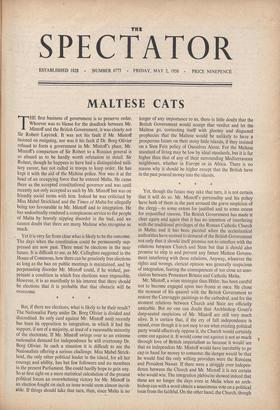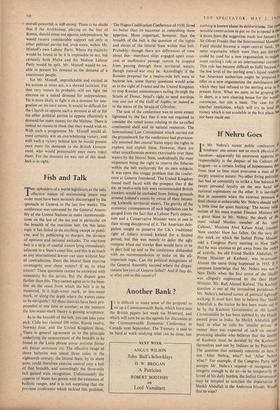MALTESE CATS
THE first business of government is to preserve order. Whoever was to blame for the deadlock between Mr. Mintoff and the British Government, it was clearly not Sir Robert Laycock. It was not his fault if Mr. Mintoff insisted on resigning, nor was it his fault if Dr. Borg Olivier refused to form a government in Mr. Mintoff's place. Mr. Mintoff's comparison of Sir Robert to a Russian general is so absurd as to be hardly worth refutation in detail. Sir Robert, though he happens to have had a distinguished mili- tary career, has not called in troops to keep order. He has kept it with the aid of the Maltese police. Nor was it at the head of an occupying force that he entered Malta. He came there as the accepted constitutional governor and was until recently not only accepted as such by Mr. Mintoff but was on friendly social terms with him. Indeed he was criticised by Miss Mabel Strickland and the Times of Malta for allegedly being too favourable to Mr. Mintoff and to integration. He has undoubtedly rendered a conspicuous service to the people of Malta by bravely nipping disorder in the bud, and we cannot doubt that there are many Maltese who. recognise as much.
Yet it is very far from clear what is likely to be the outcome. The days when the constitution could be permanently sup- pressed are now past. There must be elections in the near future. It is difficult to see, as Mr. Callaghan suggested in the House of Commons, how there can be genuinely free elections as long as the ban on public meetings is maintained, and by perpetuating disorder Mr. Mintoff could, if he wished, per- petuate a condition in which free elections were impossible. However, it is so manifestly to his interest that there should be elections that it is probable that that obstacle will be overcome.
But, if there are elections, what is likely to be their result? The Nationalist Party under Dr. Borg Olivier is divided and discredited. Its only card against Mr. Mintoff until recently has been its opposition to integration, in which it had the support, if not of a majority, at least of a reasonable minority of the electorate. If Mr. Mintoff swings over to an extreme nationalist demand for independence he will overtrump Dr. Borg Olivier. In such a situation it is difficult to see the Nationalists offering a serious challenge. Miss Mabel Strick- land, the only other political leader in the island, for all her courage and ability, has but few followers and no members in the present Parliament. She could hardly hope to gain any. So at first sight on a mere statistical calculation of the present political forces an overwhelming victory for Mr. Mintoff in an election fought on such an issue would seem almost inevit- able. If things should take that turn, then, since Malta is no longer of any importance to us, there is little doubt that the British Government would accept that verdict and let the Maltese go, contenting itself with gloomy and disgusted prophecies that the Maltese would be unlikely to have a prosperous future on their stony little islands, if they insisted on a Sinn. Fein policy of Ourselves Alone. For the Maltese standard of living may be low by ideal standards, but it is far higher than that of any of their surrounding Mediterranean neighbours, whether in Europe or in Africa. There is no reason why it should be higher except that the British have in the past poured money into the islands.
* * * Yet, though the future may take that turn, it is not certain that it will do so. Mr. Mintoff's personality and his policy have both of them in the past aroused the grave suspicion of the clergy—to some extent for justified and to some extent for unjustified reasons. The British Government has made it clear again and again that it has no intention of interfering with the traditional privileges of the Roman Catholic Church in Malta; and it has been puzzled when the ecclesiastical authorities have seemed to demand of the British Government not only that it should itself promise not to interfere with the relations between Church and State but that it should also promise to step in and prevent any future Maltese Govern- ment interfering with those relations, Anyway, whatever the rights and wrongs, clerical opinion was generally suspicious of integration, fearing the consequences of too close an asso- ciation between Protestant Britain and Catholic Malta.
Mr. Mintoff, a wiser strategist than Hitler, has been careful not to become engaged upon two fronts at once. He chose the moment of his quarrel with the British Government to restore the Caravaggio paintings to the cathedral, and for the moment relations between Church and State are officially amicable. But no one can doubt that Archbishop Gonzi's deep-seated suspicions of Mr. Mintoff are still very much alive. It is certain that, if the cry of full independence is raised, even though it is not easy to see what existing political party would effectively oppose it, the Church would certainly come out against it. It would come out against it not so much through love of British imperialism as because it would see that an independent Mr. Mintoff would have inevitably to go cap in hand for money to someone; the danger would be that he would find the only willing providers were the Russians and President Nasser. If there were a struggle over indepen- dence between the Church and Mr. Mintoff it is not certain who would win. The integration plebiscite showed indeed that these are no longer the days even in Malta when an arch- bishop can with a word obtain a unanimous vote on a political issue from the faithful. On the other hand, the Church, though



































 Previous page
Previous page